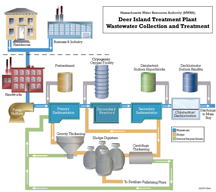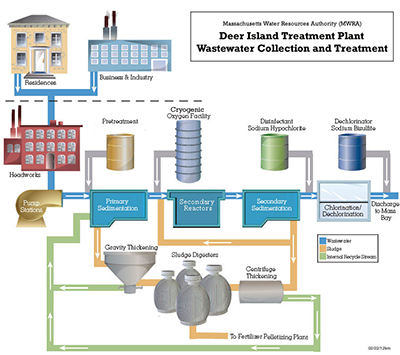
A diagrammatic representation of the operation of the Deer Island Waste Water Treatment Plant in Boston Harbor. Ending years of noncompliance with federal water treatment regulations by Massachusetts, the Massachusetts Water Resources Authority began partial operation of the plant in 1995. It became fully operational in 2000. View a larger image
Addressing the problem of sewage treatment necessarily requires confronting the question of what to do with the various products it produces, while avoiding generating new problems. This diagram, and the explanation that accompanies it at the MWRA Web site, shows how the plant design solves the sewage problem while it avoids creating new problems. For example, the methane generated in the sewage digesters is collected and used in Deer Island?s on-site power plant to create steam that supplies hot water and heat for the facility. This process is one of many other renewable energy processes the plant employs.
Image courtesy Massachusetts Water Resources Authority.
In  environmental science, and elsewhere, the term problem displacement describes what happens when solving a given problem creates a different problem. For example, sewage sludge disposal by incineration solves the sewage sludge disposal problem, but one consequence is air pollution. [Jänicke 1990] The term problem displacement is possibly a misnomer, because displacement typically refers to moving from one place to another. In most cases of problem displacement, the created problem or problems usually replace the original problem. For this reason, in these circumstances, I prefer the term problem replacement.
environmental science, and elsewhere, the term problem displacement describes what happens when solving a given problem creates a different problem. For example, sewage sludge disposal by incineration solves the sewage sludge disposal problem, but one consequence is air pollution. [Jänicke 1990] The term problem displacement is possibly a misnomer, because displacement typically refers to moving from one place to another. In most cases of problem displacement, the created problem or problems usually replace the original problem. For this reason, in these circumstances, I prefer the term problem replacement.
Problem replacement can also apply to problem solutions in organizations. It can be useful as a management tool, because it can clarify organizational status by accounting more accurately for all the costs of solving a problem. As an example, consider technical debt.
Technical debt is the collection of technology artifacts, arising by any mechanism, which we would like to revise or replace for sound engineering reasons. In many cases, if not most, organizations incur new technical debt as a consequence of solving some other problem. In our terms, much technical debt is the result of problem replacement.
For concreteness, consider upgrading a Customer Relationship Management (CRM) system. Suppose that because of financial pressures, the company decides not to upgrade the hardware that supports the CRM software. And suppose further, as is common, that the latest version of the CRM software requires a hardware upgrade. Consequently, upgrading the CRM software is impossible, which means that CRM system users must maintain existing applications — and develop new ones — based on the (now outdated) CRM software. They must later repeat that work when the new system is installed. It therefore comprises technical debt.
The debt in this example is not due to shoddy workmanship or shortcuts in implementing CRM applications. Rather, it?s the direct result of ?solving? the company?s financial problems by postponing a hardware upgrade. It?s an example of problem replacement.
In most In most organizations, the costs of
retiring software technical debt are
usually charged to the Information
Technology (IT) function. That
practice can obscure the
actual source of the problem.organizations, the costs of retiring software technical debts of this kind are usually charged to the Information Technology (IT) function. In our example, the cost of IT is thus represented as higher than it actually would be without problem replacement. Likewise, the cost of financial management is correspondingly represented as lower than it would be without problem replacement. A more accurate accounting would allocate to the financial management function, rather than to IT, the costs of carrying and eventually retiring the technical debt.
Because problem replacement scenarios are common in organizations, they account for a significant fraction of technical debt. The overstatement of the costs of the IT function, and the corresponding understatement of the costs of other enterprise elements, make responsible management of the enterprise difficult.
Some replacement problems can be termed unintended consequences. Perhaps some technical debt is unintentional. But some solutions that entail problem replacement, especially those that burden political rivals, are most intentional indeed. We?ll explore examples of that phenomenon next time. ![]() Next issue in this series
Next issue in this series ![]() Top
Top ![]() Next Issue
Next Issue
Is every other day a tense, anxious, angry misery as you watch people around you, who couldn't even think their way through a game of Jacks, win at workplace politics and steal the credit and glory for just about everyone's best work including yours? Read 303 Secrets of Workplace Politics, filled with tips and techniques for succeeding in workplace politics. More info
Footnotes
Your comments are welcome
Would you like to see your comments posted here? rbrenaXXxGCwVgbgLZDuRner@ChacDjdMAATPdDNJnrSwoCanyon.comSend me your comments by email, or by Web form.About Point Lookout
 Thank you for reading this article. I hope you enjoyed it and
found it useful, and that you'll consider recommending it to a friend.
Thank you for reading this article. I hope you enjoyed it and
found it useful, and that you'll consider recommending it to a friend.
This article in its entirety was written by a human being. No machine intelligence was involved in any way.
Point Lookout is a free weekly email newsletter. Browse the archive of past issues. Subscribe for free.
Support Point Lookout by joining the Friends of Point Lookout, as an individual or as an organization.
Do you face a complex interpersonal situation? Send it in, anonymously if you like, and I'll give you my two cents.
Related articles
More articles on Problem Solving and Creativity:
 On Beginnings
On Beginnings- A new year has begun, and I'm contemplating beginnings. Beginnings can inspire, and sometimes lead to
letdown when our hopes or expectations aren't met. How can we handle beginnings more powerfully?
 Ten Tactics for Tough Times: II
Ten Tactics for Tough Times: II- When you find yourself in a tough spot politically, what can you do? Most of us obsess about the situation
for a while, and then if we still have time to act, we do what seems best. Here's Part II of a set of
approaches that can organize your thinking and shorten the obsessing.
 Exploiting Failed Ideas
Exploiting Failed Ideas- When the approach you've been using fails, how do you go about devising Plan B? Or Plan C? Here are
some ways to find new approaches by examining failures.
 Virtual Brainstorming: I
Virtual Brainstorming: I- When we need to brainstorm, meeting virtually carries a risk that our results might be problematic.
Here's Part I of some steps to take to reduce the risk.
 Self-Imposed Constraints
Self-Imposed Constraints- When we solve problems, the problem definition and associated constraints determine the possible solutions.
Sometimes, though, solving the problem is unnecessarily difficult because we accepted self-imposed constraints
as real. How can we avoid that?
See also Problem Solving and Creativity for more related articles.
Forthcoming issues of Point Lookout
 Coming October 1: On the Risks of Obscuring Ignorance
Coming October 1: On the Risks of Obscuring Ignorance- A common dilemma in knowledge-based organizations: ask for an explanation, or "fake it" until you can somehow figure it out. The choice between admitting your own ignorance or obscuring it can be a difficult one. It has consequences for both the choice-maker and the organization. Available here and by RSS on October 1.
 And on October 8: Responding to Workplace Bullying
And on October 8: Responding to Workplace Bullying- Effective responses to bullying sometimes include "pushback tactics" that can deter perpetrators from further bullying. Because perpetrators use some of these same tactics, some people have difficulty employing them. But the need is real. Pushing back works. Available here and by RSS on October 8.
Coaching services
I offer email and telephone coaching at both corporate and individual rates. Contact Rick for details at rbrenaXXxGCwVgbgLZDuRner@ChacDjdMAATPdDNJnrSwoCanyon.com or (650) 787-6475, or toll-free in the continental US at (866) 378-5470.
Get the ebook!
Past issues of Point Lookout are available in six ebooks:
- Get 2001-2 in Geese Don't Land on Twigs (PDF, )
- Get 2003-4 in Why Dogs Wag (PDF, )
- Get 2005-6 in Loopy Things We Do (PDF, )
- Get 2007-8 in Things We Believe That Maybe Aren't So True (PDF, )
- Get 2009-10 in The Questions Not Asked (PDF, )
- Get all of the first twelve years (2001-2012) in The Collected Issues of Point Lookout (PDF, )
Are you a writer, editor or publisher on deadline? Are you looking for an article that will get people talking and get compliments flying your way? You can have 500-1000 words in your inbox in one hour. License any article from this Web site. More info
Follow Rick
Recommend this issue to a friend
Send an email message to a friend
rbrenaXXxGCwVgbgLZDuRner@ChacDjdMAATPdDNJnrSwoCanyon.comSend a message to Rick
![]() A Tip A Day feed
A Tip A Day feed
![]() Point Lookout weekly feed
Point Lookout weekly feed
 My blog, Technical Debt for Policymakers, offers
resources, insights, and conversations of interest to policymakers who are concerned with managing
technical debt within their organizations. Get the millstone of technical debt off the neck of your
organization!
My blog, Technical Debt for Policymakers, offers
resources, insights, and conversations of interest to policymakers who are concerned with managing
technical debt within their organizations. Get the millstone of technical debt off the neck of your
organization!